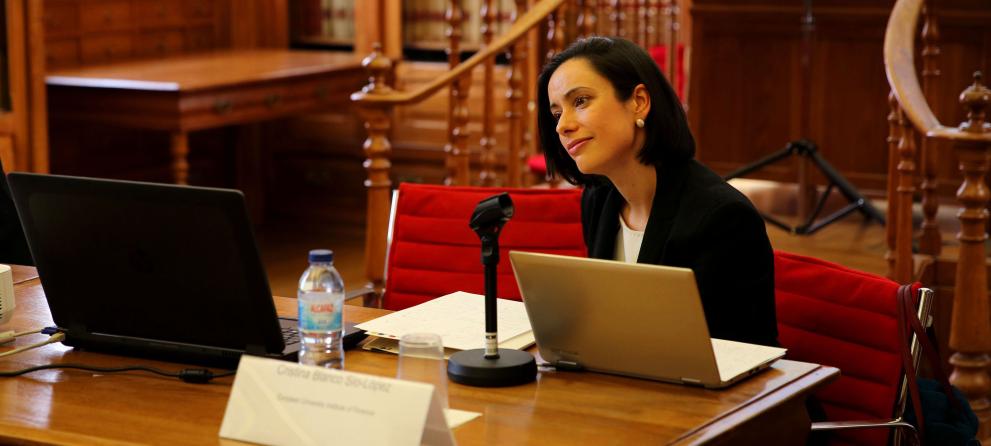
We interviewed historian and Marie Skłodowska-Curie Actions (MSCA) Fellow Cristina Blanco Sío-López on her research on the EU’s free movement of persons. In this article, Blanco Sío-López analyses some of the key challenges and opportunities of human mobility rights within the EU. Reflecting on her experience as an MSCA Global Fellow and leading researcher of the MSCA-funded project NAVSCHEN, she emphasises that the freedom to move across borders is a crucial accelerator of one’s personal and professional growth.
Human mobility then and now
In her MSCA research project ‘Navigating Schengen: Historical Challenges and Potentialities of the EU’s Free Movement of Persons’ (NAVSCHEN)’, Cristina Blanco Sío-López investigates EU human mobility rights from the inception of the Schengen Area in 1985 until the so-called Refugee Crisis in 2015, considered not just a governance crisis, but also a solidarity crisis. She specifically traces the historical roots, developments and discourses informing EU governance decisions on human mobility.
Blanco Sío-López also explores whether history can provide solutions to current challenges, such as unequal access to the freedom to move. She asks questions like Who is allowed to move across borders? Who is excluded from transnational mobility? What solidarity and diversity dimensions could be improved for refugees? As a historian, Blanco Sío-López “looks back into the past in order to see beyond.”
Limitations and possibilities of human mobility
Human mobility policy-making is closely intertwined with free market, human rights and security concerns. In the mid-1980s, many European politicians agreed that for a functioning free market, not only should goods be able to move easily, but also workers. However, the subsequent opening of internal borders increasingly solidified external ones. Blanco Sío-López points out that “we tend to forget about the human rights’ dimension. We are focussing too much on the securitisation of migration.” She emphasises the positive potential of human mobility and the need to conceive it as a fundamental human right: “It is the moment to be vocal and present when we talk about human mobility rights, given the increasing overlap of factors shaping conflict and discrimination. To explain that it can enhance our human societies and not limit ourselves to normalised and inherited mind-sets.”
Social solidarity
Human mobility can be enabled by democratic liberty or curtailed by surveillance. The challenge, so says Blanco Sío-López, is that security has increasingly become a business model that prioritises social control over social solidarity. Without solidarity, anxiety and polarisation have a fertile breeding ground. When in 2015, refugees from Syria and other countries came to Europe, a common reaction was fear. Blanco Sío-López, instead, proposes constructive engagement: “I think the solution all over history has always been to ditch fear. Fear paralyses everything.” She stresses the opportunity that comes with new ideas and talents that individuals bring as they cross borders. Empathy and inclusivity can unlock these diverse potentialities and help connect and lift one another up.
MSCA and mobility in research
Moving across boundaries and being exposed to new ideas and cultures facilitates access to one’s creative and innovative faculties. With this in mind, the Marie Skłodowska-Curie Actions’ programme has been conceived on the principle of mobility. Recipients of the MSCA grants, such as doctoral, post-doctoral and mid-career researchers, are expected to move from one country to another and between sectors and disciplines. This does not only allow them to acquire new knowledge and competences, but also to enhance their career opportunities. However, Blanco Sío-López reckons that the difficulties of constantly having to move for career development as young researchers could be alleviated through more wellbeing-centred support.
Blanco Sío-López reflects on her own experience as an MSCA Global Fellow: “There is this possibility of existing with ‘plenitude’. I have always related this to the Marie Skłodowska-Curie Actions’programme and its fellowships. I study how individuals can unlock their full potential by moving physically. You move somewhere else and realise that in this new context, and with the support of the MSCA, you can become who you really are. That is something I wish to all researchers!” Mobility is a cornerstone for self-development and innovative, open-minded research. She appeals: “Let’s break the frontiers!”
Who do we want to be?
Ultimately, how we move through the world is linked to a reflection on our identity: “Who do you want to be as a person? How do we want to live as a society? What purpose do we have as the European Union?”
Human mobility fosters creative, innovative and empathetic imaginations of the future. Breaking frontiers, in research and in life, allows individuals to expand their identity and generate new ideas. The MSCA programme is committed to support its fellows’ mobility to cultivate cutting-edge interdisciplinary and transnational research for the benefit of society.
Useful Links:
MSCA overview and funding opportunities
MSCA Work Programme 2021/2022
Details
- Publication date
- 27 July 2022
- Author
- European Research Executive Agency
